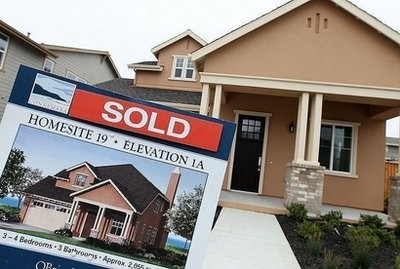New US homes sales fell to their lowest level in about half a century and manufacturing orders came in far worse than expected, the government said Wednesday, fueling concerns the world's largest economy could slip back into recession.
Adding to the recent slew of depressing data, the Commerce Department said sales of new single-family houses unexpectedly slumped 12.4 percent in July to 276,000 units from a month earlier.
July sales broke below the 300,000 mark for the first time in the data's 47 years of history, baffling most economists who had expected sales to rise to 334,000 units.
In another indication of a faltering economy, the department said orders for big-ticket items in the United States rose only slightly in July -- much lower than expected and signaling a slowdown in business spending on capital equipment.

New orders for manufactured durable goods -- items such as planes, cars, refrigerators and computers -- increased 0.3 percent to 193 billion dollars following two consecutive monthly decreases, the department said.
Most economists had expected orders to rebound by a stronger 3.0 percent.
Core capital orders -- a proxy for future business investment -- suffered a steep decline, by 8.0 percent.
Against the bearish data and worries that the US recovery from recession could stall, President Barack Obama took time Wednesday from his summer vacation to confer with his economic team.
"The president conducted a conference call this morning on the state of the economy" with Treasury Secretary Tim Geithner, head of the Council of Economic Advisers Christy Romer and National Economic Council director Larry Summers, a White House statement said.
"The discussion focused on recent data reports, global markets and economic growth," it said, as Obama spent his holiday in Martha's Vineyard, the elegant Massachusetts vacation spot.
"The economic team provided an update on the next steps to keep the economy growing including assistance to small businesses and the extension of tax cuts to the middle class," the statement added.
The sagging new home sales showed that the housing market, which was at the epicenter of the financial crisis that dragged the country into recession, remains weak despite attractive prices and record low borrowing costs.
The number of unsold new homes are at the lowest since September 1968 while the average price fell to 235,300 dollars, the lowest reading since March 2003.
On Tuesday, an industry group said existing US home sales -- considered the core of the residential real estate market -- plunged a whopping 27.2 percent in July to levels unseen in more than a decade.
"The potential for housing to drag the economy back into recession is also heightening," warned Moody's Economy.com analyst Celia Chen.
A housing mortgage meltdown plunged the US economy into the worst recession in decades in December 2007.
The economy started growing again since the middle of the year, but expansion has slowed in recent months against a high unemployment rate to the extent that some economists warn the country could be trapped in a "double-dip" recession.
Reflecting the gloom, the government is expected to significantly revise downward the economic growth chalked up in the second quarter.
The government could downgrade growth to 1.4 percent from 2.4 percent previously when it presents an economic report on Friday, most economists said.
"As we stare into the economic double-dip abyss, there are still some low hanging fruit to be picked by policy makers to aid the economy and business," said analyst Andrew Busch of BMO Capital Markets, suggesting the government cut foreign tax earnings for US companies in a bid to boost growth.
























